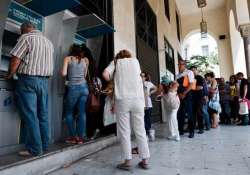Greece crisis: Greeks hit by closed banks, warnings from eurozone
Athens: Anxious pensioners swarmed closed bank branches today and long lines snaked outside ATMs as Greeks endured the first day of serious controls on their daily economic lives ahead of a July 5 referendum that

Athens: Anxious pensioners swarmed closed bank branches today and long lines snaked outside ATMs as Greeks endured the first day of serious controls on their daily economic lives ahead of a July 5 referendum that could determine whether the country has to ditch the euro currency and return to the drachma.
As strict capital controls took root following Prime Minister Alexis Tsipras' surprise weekend decision to call a referendum on international creditors' latest economic proposals, Greece's population tried to fathom the sheer scale of the impact on their day-to-day existence. Following a breakdown in talks between Greece and its creditors, the country is in the midst of the one of the most acute financial crises seen anywhere in the world in years. It's running out of time to get the money it needs to stave off bankruptcy.
That has stoked fears of a crippling bank run, a messy Greek debt default and an exit from the euro. As a result, the country's government imposed strict capital controls, none more onerous than a daily allowance of a measly 60 euros (USD 67) at the ATM.
The sense of unease was palpable among the crowds of pensioners who lined up outside bank branches hoping they might open. Many elderly Greeks don't have ATM cards and make cash withdrawals in person, and so found themselves completely cut off from their money.
ALSO READ: Greece debt crisis: Banks closed, ATM cash withdrawals limited
“I came here at 4 a.m. because I have to get my pension,” said 74-year-old Anastasios Gevelidis, one of about 100 retirees waiting outside the main branch of the National Bank of Greece in the country's second-largest city of Thessaloniki.
“I don't have a card. I don't know what's going on. We don't even have enough money to buy bread,” he said. The capital controls come ahead of a big 1.6 billion-euro payment Greece has to make to the International Monetary Fund. It's unlikely to be able to pay that without financial assistance.
ALSO READ: Asian stock markets sink after Greece closes banks
Greece's bailout program with its European creditors officially expires Tuesday, meaning the country will not have access to any of the money still available if it doesn't secure a deal.